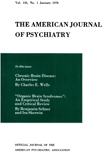PROGNOSIS IN FRONTAL LOBOTOMY BY USE OF THE MALAMUD RATING SCALE
Abstract
More than 1,000 lobotomized patients were graded according to level of achievement after convalescence had been completed, and their preoperative rating by the Malamud scale was studied in order to determine what factors were of good and bad omen. Favorable indications appeared in the fields of anxiety, obsessive thinking, and self-directed violence, while unfavorable indications appeared in the fields of hallucinations and delusions, scattered thought processes, and externally directed violence.
The apparent paradox was disclosed that patients came to operation most frequently because of the latter phenomena. Since the objective of psychosurgery is to relieve overwhelming suffering, anything gained above this, as far as level of achievement is concerned, makes the operation even more worth while. The surgeon and the psychiatrist, working together, can select patients who will give almost any desired level of achievement. From the practical standpoint, the Malamud rating scale offers a modest predictive criterion for the selection of patients for psychosurgery.
Access content
To read the fulltext, please use one of the options below to sign in or purchase access.- Personal login
- Institutional Login
- Sign in via OpenAthens
- Register for access
-
Please login/register if you wish to pair your device and check access availability.
Not a subscriber?
PsychiatryOnline subscription options offer access to the DSM-5 library, books, journals, CME, and patient resources. This all-in-one virtual library provides psychiatrists and mental health professionals with key resources for diagnosis, treatment, research, and professional development.
Need more help? PsychiatryOnline Customer Service may be reached by emailing [email protected] or by calling 800-368-5777 (in the U.S.) or 703-907-7322 (outside the U.S.).



